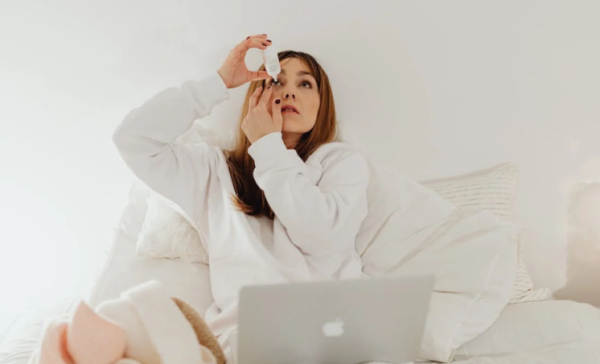According to the American Academy of Ophthalmology, 20 million people suffer from dry eye disease (DED). Moreover, in 2020, around 117.45 million Americans bought and used eye drops. While artificial tear drops offer great benefits, they also have side effects.
For instance, the U.S. Food and Drug Administration (FDA) recently warned consumers not to purchase EzriCare’s artificial tear drops. Researchers linked potential side effects such as infections and vision loss to this product.
In this blog, we will delve into the usage, side effects, categories, and alternatives to artificial tear drops.
What Happened With EzriCare?
Renee Martray, Nancy Montz, and Carla Oliva suffered chronic side effects after using EzriCare Artificial Tear drops. Renee developed permanent corneal scarring that led to vision loss. Nancy lost vision in her left eye due to a corneal ulcer. Carla became legally blind after getting an eye infection.
EzriCare stated that their tests did not conclusively show bacterial growth in the product. However, this made the victims angry, and they demanded compensation. Therefore, they filed an EzriCare lawsuit for personal injuries like eye infections and vision loss.
Researchers found Pseudomonas Aeruginosa in EzriCare Artificial Tears. These are resistant to the antibiotic Carbapenem, making it highly contagious and hard to treat.
According to TorHoerman Law, EzriCare artificial tear drops have resulted in eighty infections in America. Among them, four people died, and others had to get their eyes removed due to bacterial contamination. Apart from EzriCare, Delsam Pharma has also received criticism. The Centers for Disease Control (CDC) recalled all their artificial tear products from the market.
What Are the Benefits of Artificial Tear Drops?
Artificial tear drops offer benefits such as:
- Adding moisture to your dry eyes
- Soothing eye irritation and uneasiness
- Adding lubrication to reduce corneal friction
- Reducing swelling and redness of the eyes
Additionally, it helps with eye strain caused by prolonged screen time. Usually, you use artificial tear drops when you are in a smoky, dry, or windy location.
According to the New York Post, artificial tear drops from brands such as Systane, GenTeal, Oasis, etc., are safe to use. Thus, to gain the benefits mentioned, you must buy them from trusted brands approved by the FDA and CDC.
Side Effects of Using Artificial Tear Drops
The Mayo Clinic states that artificial tear drops fall into two categories. Preservative-free eye drops have fewer additives and no side effects. On the other hand, those with preservatives can irritate your eyes and lead to severe dryness.
Eye drops contain artificial preservatives to prolong their shelf life. Therefore, it can cause unwanted side effects such as:
- Blurred and a sudden change in vision
- Eye irritation, itching, or trauma
- Allergic reactions such as skin rashes or swelling
- Bacterial infection leading to eye pain
You might witness a temporary stinging after using the preservative-containing artificial tear drops. Either way, you should see an ophthalmologist if the eye drops are not helping with the symptoms.
Home Remedies for Eye Dryness: Alternatives to Artificial Tear Drops
You can develop eye dryness due to aging, medications, underlying conditions, eye surgery, and environmental factors. Earlier, you relied on artificial tear drops to relieve and soothe this condition. But the recent stigma may lead you to lose trust in this medication.
That is why these home remedies and alternatives can help you relieve the irritation:
- Add omega-3 fatty acids, vitamins A, D, and B12 to your diet
- Wash your eyes and eyelids a few times a day
- Use the castor oil eye drops
- Consider trying acupuncture therapy
- Blink frequently and rest your eyes
- Stop smoking and drink less alcohol
Moreover, getting eight hours of sleep and drinking enough water can help reduce eye dryness. Instead of preservative-filled eye drops, you can opt for ointments or gels. Installing filters and humidifiers in your room can help change environmental conditions like low humidity or dust.
The Bottom Line
When buying artificial tear drops, ensure you avoid EzriCare and Delsam Pharma. Both brands are under serious investigation by the CDC and FDA due to the potential presence of drug-resistant bacteria.
You can consult an ophthalmologist for eye irritation or dryness. It will help you get the best treatment without worrying about side effects. Furthermore, you should choose a product that does not contain preservatives. This way, you can use them four to six times a day, depending on the extent of your eye irritation or dryness.
When using the product, ensure you wash your hands and face. Moreover, do not let the tip of the bottle touch your eye, as it could contaminate the liquid. Artificial tear drops have immense benefits, but prolonged use can cause serious side effects. Therefore, you should look for alternatives or limit usage.





